In Bangladesh, there’s a big worry because the worst dengue fever outbreak ever is happening. Almost 600 people have sadly died from this sickness spread by mosquitoes this year. The country’s health system is struggling a lot and might not be able to handle the situation. They’re getting more than 2,000 new cases reported every day, which is a huge problem.
In the vibrant land of Bangladesh, a yearly concern emerges as the monsoon season sweeps in between the months of July and September. It’s during this time that dengue fever, a potentially deadly illness, becomes a worrisome presence. The culprits behind the spread of this disease are none other than Aedes mosquitoes, known for their affinity towards breeding in pools of freshwater and rain drains. These tiny yet troublesome insects bring about a significant health risk, as thousands of people in the country fall victim to their bites, succumbing to the threat of this viral ailment.
Across the span of two decades, there has been a noticeable rise in the number of dengue fever cases. Standing out vividly was the dengue outbreak of 2019, casting its shadow as the most severe. In that particular year, a staggering count of over 100,000 individuals fell ill with dengue, spanning every corner of the nation.
Since the beginning of this year, up until just this past Friday, the health authorities in Bangladesh have been keeping track of some concerning numbers. Reports show that a total of 593 individuals have sadly lost their lives due to dengue fever. This mosquito-borne illness has affected a significant 123,000 people, leading them to be admitted into hospitals for treatment. These figures shed light on the importance of addressing this issue and finding ways to protect people from dengue fever.
In August, only the month we’re in now, hospitals have taken care of many people with dengue illness. The sickness is spreading quickly, and this shows that the time when the outbreak will be at its worst is still ahead.
In the landscape of health concerns, a prolonged bout of dengue could potentially result in a surge of illnesses and unfortunate fatalities. This situation places significant demands on our healthcare systems and the devoted healthcare workforce that tirelessly safeguards our well-being. The task of managing the increasing number of patients is becoming increasingly intricate.
Adding to the complexity, individuals tasked with curbing the mosquito population within our communities find themselves grappling with an overwhelming workload. Dr. M. Mushtaq Hussain, a distinguished senior advisor affiliated with Bangladesh’s esteemed Institute of Epidemiology, Disease Control and Research, expounded upon these matters during a recent discourse with Arab News.
“He mentioned that if the rain doesn’t stop, the dengue outbreak will stay bad throughout September.”
At the start of the year, in January, the World Health Organization raised an alarm about dengue, a rapidly spreading illness in tropical areas. This disease is a significant danger to people all around the world, like a big problem we need to tackle together. Looking at Bangladesh, the places where they usually help sick people were not fully prepared to face this challenge.
Hussain emphasized how our healthcare systems are not quite ready for a big dengue outbreak turning into an epidemic. He pointed out that in our cities, there aren’t enough different types of health centers. This makes it tough for everyone with dengue to receive care. Those who end up in the hospital didn’t get help early, so they became very sick when they finally went. This situation calls for better planning and quicker action to help those affected by dengue.
The dengue problem is getting worse because the weather is changing. This is happening more in places like Bangladesh. They are also having trouble stopping mosquitoes from spreading. This makes the dengue problem even bigger. So, both climate change and mosquito spread are causing more people to get sick with dengue.
“Preventing the increase of dengue patients in the future is a challenge we face. To make sure we can control the Aedes mosquitoes that spread dengue fever, it’s important to use scientific methods for mosquito management.
This is what Prof. Dr. Kabirul Bashar, an expert on bugs from Jahangirnagar University in Dhaka, explained to Arab News through AFP. If we don’t apply these methods correctly, the number of people getting sick with dengue could go up. So, taking care of these disease-spreading mosquitoes is something we need to focus on. dengue fever

